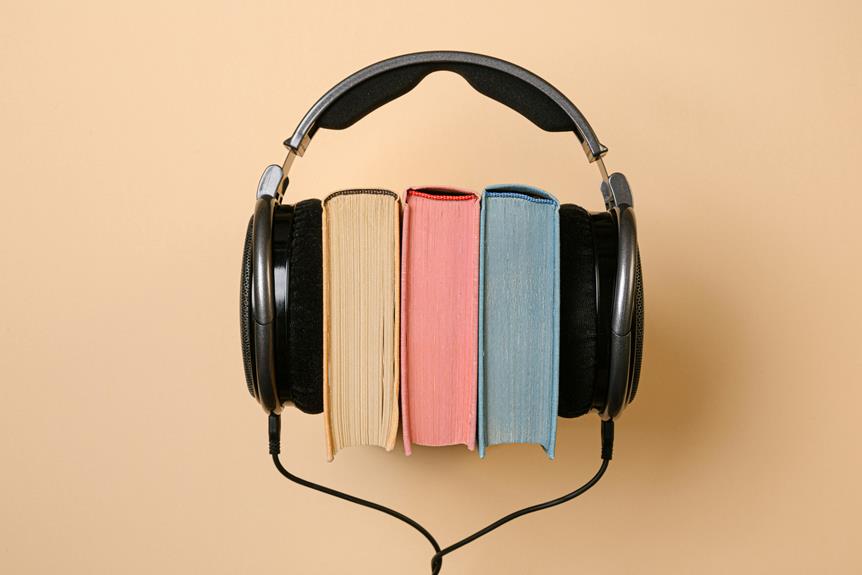
Have you ever wondered how audiobooks stack up against the traditional way of consuming stories? The debate between listening to a narrator bring a tale to life and immersing yourself in the written word goes beyond personal preference. While audiobooks offer flexibility, some argue they might impact how we remember and connect with the content. Understanding the nuances between these two mediums could shed light on which one truly resonates with you. So, which do you think comes out on top – the spoken word or the written page?
Pros and Cons of Audiobooks
When choosing between audiobooks and traditional reading, consider the convenience and immersion offered by audiobooks.
Audiobooks provide a hands-free experience, allowing you to listen while driving, exercising, or doing chores. They offer flexibility, enabling you to enjoy a book even when your hands and eyes are occupied. This convenience is a significant advantage for individuals with busy schedules who struggle to find time to sit down with a physical book.
Moreover, audiobooks enhance immersion through voice narration, sound effects, and music. The narrators' tones and expressions can bring characters to life, making the story more engaging. The added elements create a multisensory experience that can deepen your connection to the plot and characters. This immersive quality can make audiobooks a compelling option for those who enjoy a more theatrical approach to storytelling.
On the downside, some argue that audiobooks may lead to decreased retention compared to traditional reading. Without the visual reinforcement of words on a page, listeners might find it harder to remember details or quotes from the book. Additionally, the pace of an audiobook is set by the narrator, potentially limiting your ability to linger over certain passages or skim through information quickly.
Cognitive Differences Between Listening and Reading
Exploring the cognitive variances between listening and reading can provide valuable insights into how each medium impacts comprehension and retention. When you listen to an audiobook, your brain processes information differently compared to when you read a physical book. Listening relies more on auditory processing and can enhance your ability to grasp intonations, emotions, and pacing in the narrator's voice.
This auditory stimulation may lead to a more immersive experience, allowing you to visualize the story in a unique way. On the other hand, reading involves visual processing, which can improve your focus and concentration as you mentally create images based on the text. Additionally, reading provides a slower pace, giving you more control over the speed of absorbing information.
While both listening and reading engage the brain and enhance comprehension, understanding these cognitive variances can help you choose the medium that best suits your learning style and preferences.
Impact on Comprehension and Retention
Listening to audiobooks and reading traditional books can have distinct impacts on your comprehension and retention abilities. When you listen to an audiobook, your comprehension may rely more on auditory processing and your ability to concentrate on the spoken words. This can be beneficial for auditory learners who absorb information better through listening. However, reading a physical book allows you to engage visually with the text, which can enhance your comprehension through seeing the words on the page and creating mental images.
In terms of retention, traditional reading often leads to better memory recall compared to audiobooks. When you read a book, you may retain information more effectively because the act of visually scanning and processing the text can create stronger memory connections. On the other hand, audiobooks may require different memory mechanisms, such as auditory cues or verbal repetition, to help retain information. Ultimately, the impact on your comprehension and retention may vary depending on your learning preferences and the material being consumed.
Emotional Connection to Narratives
Engaging with narratives through audiobooks or traditional reading can evoke strong emotional connections, influencing your overall experience with the story. When listening to an audiobook, the tone, pace, and intonation of the narrator can deeply impact how you connect with the characters and the plot. The voice acting can bring characters to life in a way that resonates with you emotionally, making the story more vivid and engaging.
On the other hand, traditional reading allows you to interpret the emotions and nuances of the story through your own internal voice. As you read the words on the page, you might find yourself projecting your feelings onto the characters and situations, forging a personal connection with the narrative. This intimate engagement with the text can create a profound emotional experience that's unique to traditional reading.
Whether you prefer the immersive quality of audiobooks or the introspective nature of traditional reading, both mediums have the power to elicit strong emotional responses and enrich your overall enjoyment of the story.
Personal Preferences and Recommendations
When considering your personal preferences for experiencing narratives, it's important to reflect on how audiobooks or traditional reading align with your unique tastes and habits. If you enjoy multitasking or have a busy schedule, audiobooks might be a great fit, allowing you to listen while driving, exercising, or doing chores.
On the other hand, if you savor the tactile experience of holding a book, turning its pages, and immersing yourself in the written word without distractions, traditional reading could be more appealing to you.
Consider your environment and lifestyle when deciding between audiobooks and traditional reading. If you have a noisy household or find it hard to concentrate in silence, audiobooks can provide a way to enjoy stories without external disruptions. Conversely, if you crave solitude and cherish the quiet moments spent with a book in hand, traditional reading may offer the tranquility you seek.
Ultimately, your personal preferences and daily routines should guide your choice between audiobooks and traditional reading. Experiment with both formats to discover which enhances your reading experience and brings you the most enjoyment.




